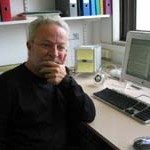Link to Pubmed [PMID] – 3489435
Ann. Inst. Pasteur Immunol. 1986 Jul-Aug;137D(1):33-45
Hybridoma collections were produced from lipopolysaccharide-stimulated adult BALB/c spleen cells, small resting spleen B cells and large activated spleen lymphocytes. The hybridomas were examined for production of immunoglobulins and of antibodies directed against a panel of self (actin, myosin, tubulin, DNA) and non-self antigens (myoglobin, spectrin, trinitrobenzene). From the 345 hybridomas secreting immunoglobulin, 68% did not react with any antigen of the panel, 17% reacted with only one, 5.5% with 2 and 7.9% with 3 or more. Apparently, each of the monoclonal multispecific antibodies exhibited a pattern of reactivity which was quite unique. There were no apparent differences in antibody reactivities between self and non-self antigens; moreover, with the exception of DNA, no differences were noted among the 3 different hybridoma collections.
